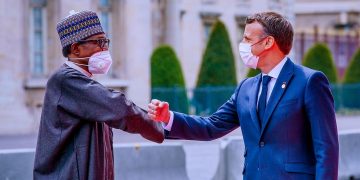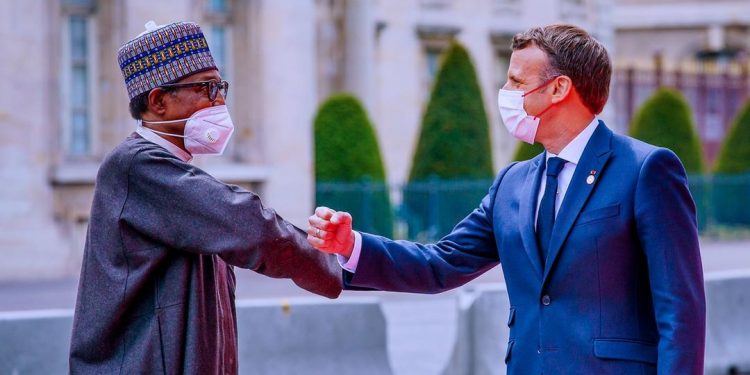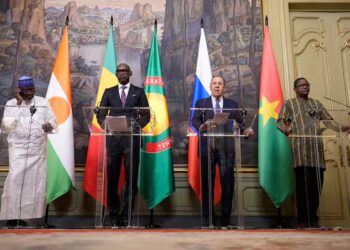President Muhammadu Buhari has said France and Nigeria should deepen anti-terror cooperation to fight groups such as Boko Haram.
The president who is currently in Paris to attend the African Finance Summit hosted by French President, Emmanuel Macron made the remark in an article published by leading Paris-based magazine, Le Point.
According to him: “Now Nigeria and France should deepen our anti-terror cooperations if we are to overcome this scourge – particularly in the aftermath of the murder of the late President of Chad,” President Buhari said.
“We must be agile and flexible, cooperating across our borders to cut the head off their groups.”
A full copy of the president’s article seen by Heritage Times reads:
POST-COVID-19 PANDEMIC, NIGERIA AND FRANCE MUST SEIZE THE CHANCE TO STRENGTHEN MILITARY AND ECONOMIC TIES.
By Muhammadu Buhari, President, Federal Republic of Nigeria.
Today, leaders from across Africa meet in Paris to discuss plans to recover from the impact of a common enemy – COVID-19. But for African nations from across the Sahel region and beyond, the issues are inseparable from the fight against another common enemy which is terrorism. And like the war against the Coronavirus, it is one we are fully united with France in our strong determination to overcome.
Across the world, conflict and Coronavirus have not been far apart. As governments have struggled to contain COVID, jihadists have taken advantage in the Sahel – the vast arid stretch of territory that lies between the Sahara and Sub-Saharan Africa. Terrorist incidents have become tragically common across Mali, Burkina Faso and Niger. Around the Lake Chad Basin, Boko Haram terrorism have taken advantage of the pandemic and pushed back into my country Nigeria, whilst still launching raids and attacks in Chad, Cameroon, and Niger.
We have seen more than once how Boko Haram – which in French means “l’éducation occidentale est un péché” – can regroup, morphing in form and tactics. A matter of only a few years ago, they were reduced to a territory-less group, where once they had controlled an area in Nigeria three times the size of Lebanon. It has demonstrated why pushing against one front can prove futile if groups can simply migrate to ponds of insecurity across porous borders. Yet as instability has spread, so the networks that sustain it have strengthened – whether that be weapons supply chains from Libya, ideological imports of Al-Qaeda and ISIS from the Middle East, or trafficking networks that take money from those escaping instability and feeds it back into the system that generates it.
Meanwhile the infection is spreading further afield and reaching into the heart of Europe and France is not being spared the malignant, with innocents murdered on its streets. In that context, our fate is linked. Hence Paris has been active in this common fight. The French Operation Barkhane has provided critical boots on the ground in shoring up security across our region. Though challenges remain, it has ensured a wide expanse of territory has not descended into lawless playground where terrorists masquerading as fighting for Islam groups can freely flourish and multiply. That assistance has been profoundly appreciated in the region.
Now Nigeria and France should deepen our anti-terror cooperations if we are to overcome this scourge – particularly in the aftermath of the murder of the late President of Chad. Where for historical ties, support came to Nigeria from the UK, and to the G5 from France, the terrorists do not recognise these border-aligned distinctions. We must be agile and flexible, cooperating cross our borders to cut the head off their groups.
Indeed, we have already done much to strengthen our bond. Intelligence sharing is well developed, along with training against improvised explosives. But there is more we can do in cross-border military exercises and coordinating strategy. At the same time, we know France has borne much of the strain for combating terrorism of the region, and we – the leaders of Sahel countries – must also do more to present a unified front to lobby other Western nations, particularly Great Britain and the United States and the European Union for further military and humanitarian assistance.
However, we know that military gains do not provide the whole solution. Without security, economic opportunity remains fragile. Without economic opportunity, the propensity for conflict grows. The solution must therefore be two pronged. If we do improve those conditions, it leaves our people vulnerable to indoctrination, as one is vulnerable to COVID-19 without a vaccine.
In the Sahel, crises converge. Traditionally, this vast arid land has been poorer than its Mediterranean neighbours to the north and fertile land to its South. Now, climate change and environmental degradation squeeze the region of water sources, draining opportunity and increasing competition amongst various groups for scarce resources. The fallout from Libya has flushed the whole region with weapons, making any disputes and competition far more destructive. And it is upon these conditions, the lies and propaganda of terrorists who falsely claim to be Islamists promising salvation can find an audience. Islam is a religion of peace.
To counteract these, we must focus on initiatives that sustainably spread opportunity far and wide across the Sahel. Transport links across the Sahel have become dilapidated, much of it still the remnants of the colonial era. For the region’s burgeoning young population, reinvigorating these links or building anew is critical. It allows for efficient allocation of labour; the movement of inputs such as seed, fertiliser or equipment to the areas that need it; and freight to take produce or extractives to market or value-add factories.
Now, as the world emerges from the pandemic, we have the chance to build back better. Though we always knew it, COVID-19 underlined how interconnected and interdependent the world is. With that shattering reminder, we can create a world with that idea at its forefront – one that provides security and opportunity for both of us.




































